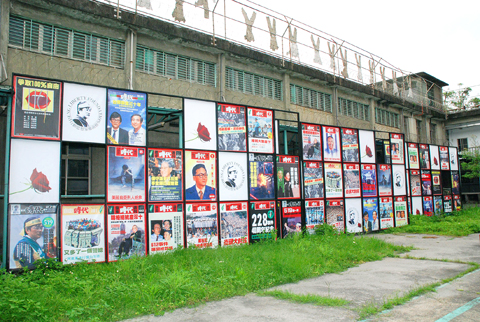Preserving infamous former prisons and turning them into museums may help to teach future generations important human rights lessons, speakers at a panel on prison museums said yesterday.
The panel — part of the Green Island Human Rights Arts Festival — was held yesterday by the Council for Cultural Affairs (CCA) at the Taiwan Human Rights Memorial in Jingmei (景美), Taipei.
The Jingmei human rights memorial park is home to the courtrooms where political prisoners were tried during the 1960s to the 1980s period of the Martial Law era, and the facilities where they were imprisoned.

PHOTO: CNA
Political prisoners from the former Jingmei martial law prison stayed in very small cells with toilets located inside the cells.
They were often tortured, abused and forced to work as cheap labor, former political prisoners said in a video shown prior to the beginning of the panel.
“It’s important to preserve these buildings so that people can be reminded of what once happened here — if we don’t know our history, it may repeat itself,” CCA vice-chairman Wu Chin-fa (吳錦發) told the audience.
“If we’re unaware of it, human rights abuses could continue to happen in any corner of society — maybe in different forms — even in a democracy,” he said.
Guest speaker, Rich Weideman, public affairs chief for the Golden Gate National Recreation Area in California, agreed that former prisons have important educational value.
He has worked as a tour guide at Alcatraz Island prison since 1980 and participated in the design of education curriculums about the prison.
Alcatraz was first used as a military base to protect San Francisco from attacks in the 1850s. It was turned into a military prison in 1909, and then a federal prison in 1934.
The prison was closed in 1963, and it was officially inaugurated as a tourist attraction in 1972.
“People have many misconceptions about prisons, because Hollywood movies and the media glamorized life in Alcatraz,” he said. “Therefore I think a tour of the prison presents a very good educational opportunity.”
To show what life on Alcatraz was really like, visitors follow in the steps of prisoners from the moment they arrived on the island. The tours are accompanied by voice recordings of former prisoners, guards and their families, telling their stories, Weideman said.
“It’s very important [for tourists] to get into the mindset of these prisoners — and some actually leave the place in tears,” he said.
“If what we do keeps even one kid out of prison, it’s worth the effort,” he said.
Park Goo-yong, a philosophy professor at South Korea’s Chonnam National University, and one of the planners of the May 18 Liberty Park in Gwanju, South Korea, shared similar views.
The May 18 incident happened in 1980 when tens of thousands of South Koreas demonstrated against military dictator Chun Doo-hwan — who had just taken control of the government following a coup — but were faced with a violent crackdown.
In order to commemorate the event, the May 18 Liberty Park was created in 1998 to preserve the martial-law courtroom and the military prisons.
“For many Koreans, the May 18 incident belongs to the past, and people only think about it every May,” Park said. “With the park and preservation of the historic space, we intend to educate our children about the history, so that they can learn about the core values of the uprising.”

Alain Robert, known as the "French Spider-Man," praised Alex Honnold as exceptionally well-prepared after the US climber completed a free solo ascent of Taipei 101 yesterday. Robert said Honnold's ascent of the 508m-tall skyscraper in just more than one-and-a-half hours without using safety ropes or equipment was a remarkable achievement. "This is my life," he said in an interview conducted in French, adding that he liked the feeling of being "on the edge of danger." The 63-year-old Frenchman climbed Taipei 101 using ropes in December 2004, taking about four hours to reach the top. On a one-to-10 scale of difficulty, Robert said Taipei 101

Nipah virus infection is to be officially listed as a category 5 notifiable infectious disease in Taiwan in March, while clinical treatment guidelines are being formulated, the Centers for Disease Control (CDC) said yesterday. With Nipah infections being reported in other countries and considering its relatively high fatality rate, the centers on Jan. 16 announced that it would be listed as a notifiable infectious disease to bolster the nation’s systematic early warning system and increase public awareness, the CDC said. Bangladesh reported four fatal cases last year in separate districts, with three linked to raw date palm sap consumption, CDC Epidemic Intelligence

Two Taiwanese prosecutors were questioned by Chinese security personnel at their hotel during a trip to China’s Henan Province this month, the Mainland Affairs Council (MAC) said yesterday. The officers had personal information on the prosecutors, including “when they were assigned to their posts, their work locations and job titles,” MAC Deputy Minister and spokesman Liang Wen-chieh (梁文傑) said. On top of asking about their agencies and positions, the officers also questioned the prosecutors about the Cross-Strait Joint Crime-Fighting and Judicial Mutual Assistance Agreement, a pact that serves as the framework for Taiwan-China cooperation on combating crime and providing judicial assistance, Liang

US climber Alex Honnold left Taiwan this morning a day after completing a free-solo ascent of Taipei 101, a feat that drew cheers from onlookers and gained widespread international attention. Honnold yesterday scaled the 101-story skyscraper without a rope or safety harness. The climb — the highest urban free-solo ascent ever attempted — took just more than 90 minutes and was streamed live on Netflix. It was covered by major international news outlets including CNN, the New York Times, the Guardian and the Wall Street Journal. As Honnold prepared to leave Taiwan today, he attracted a crowd when he and his wife, Sanni,